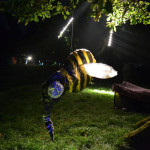Die Mason Die is the London-based four-piece fronted by 21-year-old Samuel Mason. Exponents of the (self-invented) genre ‘ghost folk’, they released their debut single ‘Lost’ last October, followed shortly after by an EP, ‘Tongues In The Clamp’. They also contributed earlier this year to Daniel Johnston‘s Space Ducks album.
About to release their next single, ‘You’re Lonely’, we caught up with the man behind the stirring vocals and evocative lyrics.
GIITTV: Sam, can we start with the name: Die, Mason Die. Now we can guess the ‘Mason’ part, but what’s the ‘Die’ relevance?
SM: Before Die Mason Die, I played alone as a solo acoustic act. After a year, I found it all to be a little limiting and was getting roped in with the endless number of singer-songwriter types that I felt were a world away from the music I was making and wanted to make. The name is just a siren to the end of that and beginning of this.
GIITTV: And some beginning it has been too! You have the new upcoming single, but you, in fact, made your official debut in 2012 with ‘Lost’ and the ‘Tongues In The Clamp’ EP, didn’t you.
SM: ‘Lost’ was our first official release and the ‘Tongues In The Clamp’ EP was three live tracks accompanying the single. We made it after only being together for about three weeks; it was fun but the development in sound since then has been large indeed.
GIITTV: Given the style of your music, the Die Mason Die name would perhaps suggest a sound of a much heavier nature?
SM: It’s more of a tag to the tension we try to create rather than genre, but yes unfortunately we do have a number of people expecting something in the area of death metal. We don’t mind the presumptions.
GIITTV: You’ve tagged the term ‘ghost folk’ to depict your style of music. What is a ‘ghost-like’ – as you state on your Facebook page that you make?
SM: When pushed to fill in the genre tag, we found it difficult to sit on the typical ‘Indie’, ‘Folk’ labels as they are simply not accurate, so we used ‘ghost folk’ as something slightly less direct and confined. We have our roots in folk but we’re more focused on creating soundscapes and textures.
GIITTV: So no reference to actual spooky ghosts then! But have you ever seen one?
SM: Once. On a school trip I thought I saw one, but I’m not the superstitious type so I very much doubt it was, had probably just eaten too many Mars bars and was starting to sugar trip.
GIITTV: Getting back to Daniel Johnston briefly, many may have come to hear of DMD by way of your inclusion of ‘My Favourite Cave’ on Space Ducks. How did you become involved there?
SM: Our manager used to work with Daniel and was aware of the project Space Ducks. We wrote a song for it and Daniel liked it, so it went on the album. We had a great time working on that track and it came together really quickly.
GIITTV: You’re about to release ‘You’re Lonely’, which is already causing a bit of a sensation. Where do you rate this in terms of your writing so far? One of your best – the best so far?
SM: I wrote ‘You’re Lonely’ when I was 17. It was written acoustically and I liked that it was very simple and direct, with that in mind I felt there’d be room to make it a wash of different textures and really make each section a very different beast, I don’t know if it would be our best song but as sonics and textures go we were very pleased with what we achieved.
GIITTV: The video, too, for it, has just been released. Tell us about the making of that? How involved were you?
SM: The video came from a short film we were fans of, we felt it was a perfect fit so we contacted the director and the editor created a new cut especially for ‘You’re Lonely’. It’s all about things you rely on, but all open to interpretation. It was something completely different to what we’d done before and an enjoyable process.
GIITTV: ‘Lost’ and ‘You’re Lonely’ both follow a somewhat melancholic line. Would that describe you: morose, inward-looking? Or is this a creative outlet for emotions and feelings that would not otherwise be expressed, or have difficulty in doing so?
SM: Everyone has their demons but luckily for me I can feed everything into writing. I think without it I’d have found another place to vent whether another art form, sport or yelling at strangers.
GIITTV: How did Young & Lost Club come to pick up on you?
SM: We threw the release at some labels and waited for bites. From them we chose Young and Lost – it’s a great label for acts in the early stages of their career and some great names have had their early releases there. And we had a fun time playing an acoustic show for them so we knew them personally.
GIITTV: You’ve played a number of low-key gigs and of course have the single launch one coming up. What’s the live experience like for you? Is it something you enjoy, or are you more comfortable writing and recording?
SM: I think we all enjoy both aspects in different ways. I love the recording process due to the satisfaction of coming out with a finished a product, a created piece that wasn’t there before. But live is such an immediate sense of enjoyment and there is a special something when screaming your songs out to room full of people, I feel very invigorated and vulnerable at the same time.
GIITTV: You are also to play the 300-plus capacity venue Hoxton Bar & Kitchen in London, in October. Is this your largest venue to date? Is this part of a UK tour?
SM: This will be our third time playing there, in fact. I’m not too sure if it’s the largest, but it’s a terrific place to play and always a lot of fun. It’s not part of a tour yet, but we’re making steps towards a tour at some point.
GIITTV: More than one person has commented to me that they hear a touch of Coldplay in your music. I don’t hear that, personally, but would you agree with that reference at all? Have Coldplay or any other artist been influential at all?
SM: People can take whatever they wish from our music. We don’t understand the Coldplay reference either! Our influences are very diverse and forever changing, but a few artists we will keep going back to are Talk Talk, Tom Waits, Thee Oh Sees and The Smiths among others.
GIITTV: Introduce us to the rest of DMD, because there are, in fact, four of you, aren’t there. How did you all meet to form the band?
SM: Stefan Ferguson was the first recruit to DMD, he plays lead guitar and delivers some delightful vocal harmonies. We met at a bar he ran with his brother and I shouted at him until he agreed to play with me. George Cramer plays bass, I lived in Australia for 5 years, George and I went to secondary school together and used to play bad indie music, I also shouted at him to move from Sydney to London to play music with me. Dave Wade Brown plays drums and adds deep backing vocal goodness, a friend of mine James, aka ‘Lonesound’, knew we were looking for a drummer and thought Dave would fit right in.
GIITTV: You play an instrument called an omnichord – could you describe this and its sound. Where might it be heard on ‘You’re Lonely’?
SM: It’s basically an ‘electric harpsichord’ – I like it because it’s pretty easy to play and tonally it has a haunting child-like feel. It doesn’t heavily feature in ‘You’re Lonely’ but is the lead instrument in ‘My Favourite Cave’.
GIITTV: You were born in Wales, raised in Australia, now in England – are you a nomad by nature, or do they keep chucking you out of places?!
SM: I went to about five different primary schools, and four different secondary schools! My parents were always moving so I became very accustomed to constantly changing surroundings. I’ve been in London for about two-and-a-half years now; that’s the longest I’ve ever stayed anywhere. If it wasn’t for the whole music thing I think I would probably have kept going.
GIITTV: Do you speak Welsh at all? If you do – go on, say something!
SM: Pen Pidyn is a phrase used frequently growing up in Wales…
GIITTV: I hope that’s nothing rude! [A later check establishes that it means ’dickhead’]
GIITTV: Was it an obvious move to seek ‘fame and fortune’ back in the old country?
SM: Maybe, in different guises. Most wanted to be footballers, I wanted to be a winger for the Welsh rugby team until I picked up a guitar!
GIITTV: How long have you been back in the UK, and was music always the career you expected to take up?
SM: I came back at 17, I liked Australia and would have stayed but I’ve always known I wanted to play music and was well aware London was the place to do it.
GIITTV: What is this journey on a bus that you took in Australia that I have heard about – that is to become some type of documentary…?
SM: Myself and 12 friends drove a 1950’s double-decker bus across the globe. It was an amazing seven months and at some point in the future there will be a documentary film coming out. But there is all in all about a year’s worth of footage to edit so getting it perfect takes time.
GIITTV: You are still relatively young at 21, what are both your immediate plans for this year, and looking further ahead?
SM: Yep still the big 21. We’ve got the single launch, of course, and that’s our first headline show. That should be great fun. The rest of this year is all about getting everything to where it should be and a continued spell of writing, we aim to keep on pushing and developing. That’s the only aim. Make good art.
GIITTV: I guess an album is next on the cards, would that be right? How much material do you have for that, and when might we be looking at the final product?
SM: We have enough songs to fill an album, but they might not necessarily be the right songs. We are still evolving as a unit so a finished DMD album will be a few more months away, but we have been talking about it.
Die Mason Die play London’s Sebright Arms on 3rd September, as their single launch show.
The single, ‘You’re Lonely’ is released on 9th September via Young & Lost Club Records.
Twitter: @DieMasonDie




